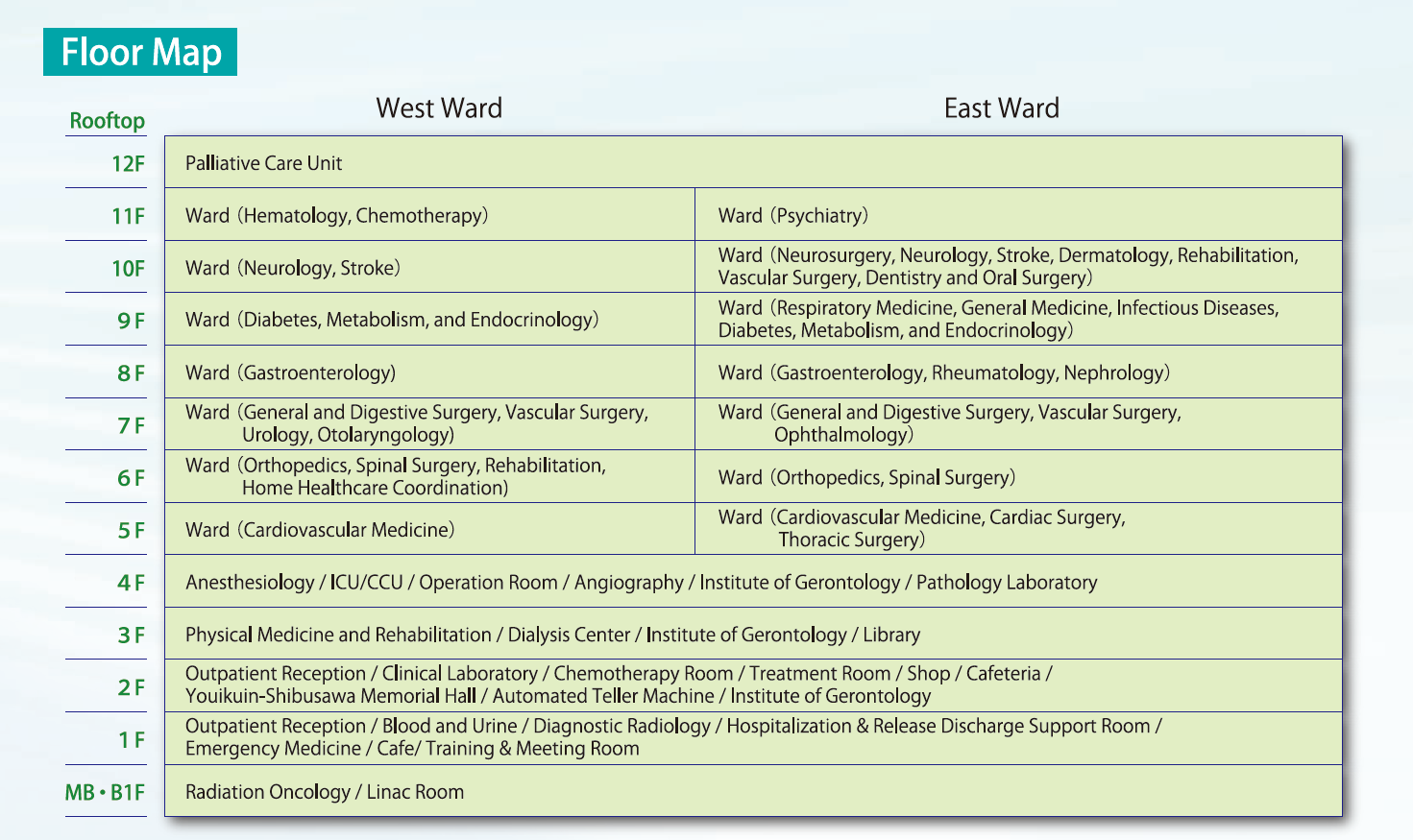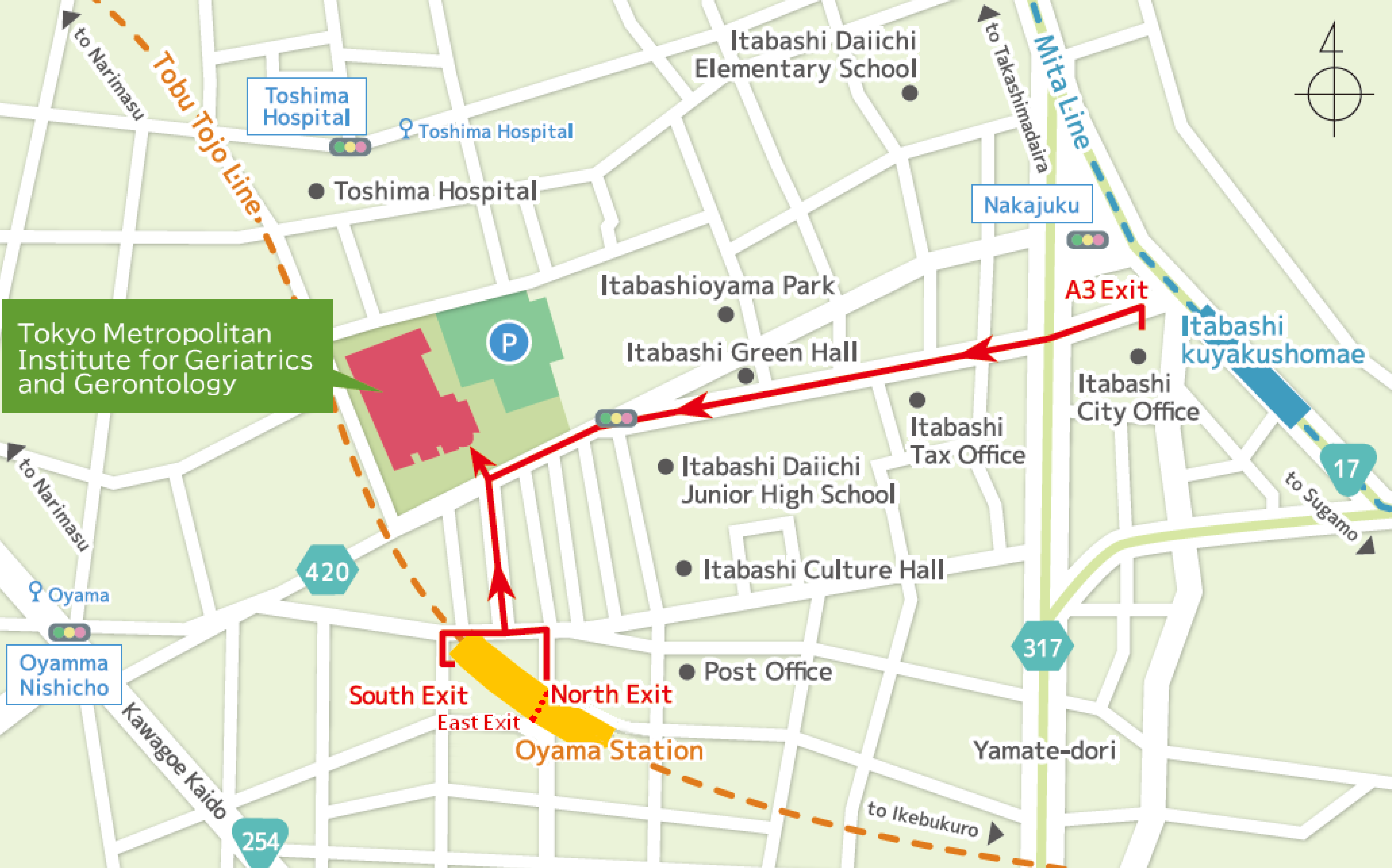The motto of the Tokyo Metropolitan Institute for Geriatrics and Gerontology is to achieve"medicine with which patients and their families are pleased". Our hospital has been focusing on the treatment of cardiovascular disease (stroke, cardiac disease, aortic disease, and peripheral arterial disease), cancer, dementia and diabetes, which are closely related to emergency issues commonly seen in older adults. While these four pillars are our most important specialties, we also provide advanced medical care for common diseases in older people including bone/joint diseases, renal diseases, sensory disorders (cataracts and deafness)and lung diseases. Our hospital has been taking an active role focusing on advanced and specialized medical care for older adults, while developing a community health care model in the secondary medicine zone of the northwestern area of Tokyo, which has a population of 2 million. In addition, as an advanced medical center specialized in geriatrics, we will constantly confirm how advanced and cutting-edge medical care can be provided to older patients and what results can be obtained as a result of providing cutting-edge medical care. Furthermore, we believe that it is our important mission to open up a "healthy and happy" future for older adults by developing minimally invasive medical care that is friendly to older patients as much as possible.
Our research institute elucidates the mechanisms of aging and age-related diseases, such as dementia, frailty and sarcopenia, which are common in older adults, and applies the results for disease prevention, early detection and treatment. In addition, by collecting various data on the health and daily living through cohort studies, we are actively conducting research related to the next generation of medical care and nursing care for older people, focusing on dementia and frailty. Our center is a specialized hospital and research institute responsible for Japan's super-aged society. Based on our research results, we play an important role in creating a system to care for the society. Our center is not only an advanced hospital and research institute, but also a general center that promotes the health of older adults in the community by integrating the research institute and the hospital. In addition, the hospital and the institute are working together for prevention, early detection and treatment of geriatric syndromes such as impaired activities of daily living, frailty and dementia, which contribute largely to a decline in quality of life among older adults. We are promoting three projects, the "Healthy Aging Innovation Center" the "Integrated Research Initiative for Living Well with Dementia," and the "Center for Comprehensive Care and Research on Prefrailty" and this involves creating a society where every person can lead a healthy life.
In light of our origin as "Youiku-in" that was established in 1872, our center has played an important role in the welfare and medicine for older adults in Japan for more than 150 years. Accordingly, we should continue our steady efforts to be the leading hospital and research institute that proactively locate the problems within the aged society and progressively find solutions to create a better tomorrow for our patients and citizen of Tokyo.
Official total number of beds:550 (general ward: 520, psychiatry ward:30)
550 (general ward: 520, psychiatry ward:30)
[Medicine] Internal Medicine, Rheumatology, Nephrology, Diabetes, Metabolism, and Endocrinology, Cardiovascular Medicine, Respiratory Medicine, Gastroenterology, Neurology, Hematology, Infectious Diseases, Palliative Care, Psychiatry
[Surgery] Gastrointestinal and General Surgery, Vascular Surgery, Cardiac Surgery, Thoracic Surgery, Neurosurgery, Orthopedics, Dermatology, Urology, Ophthalmology, Otolaryngology, Dentistry and Oral Surgery, Emergency Medicine, Anesthesiology
[Other Divisions] Physical Medicine and Rehabilitation, Radiology, Radiation Oncology
*Departments other than clinical divisions: Department of Clinical Laboratory, Department of Pathology
Secondary emergency care institution designated by Tokyo Metropolitan: Care provided 24 hours a day, 7 days a week, by the CCU (coronary care unit) and the sudden onset stroke institute
Monday-Friday: 9:00 ~ 17:00
Saturday: 9:00 ~ 12:00
※Please note that not all clinical divisions operate consultation services every weekday.
※On Saturdays, only the emergency medicine department is open.
Closed: Sunday, Holidays, and 12/29 ‒ 1/3
Reception Open: 8:30
All consultations are BY APPOINTMENT ONLY. TEL 03-3964-4890(for appointments)
Appointment Desk: Monday ‒Friday: 9:00 to 17:00
Closed on Saturday, Sunday, and National holidays
Reinforced concrete construction/ partial steel framed structure, steel-framed reinforced concrete construction.
Number of above ground floors: 12, Number of basement floors: 2, Number of rooftops: 1
Lot size: 50,857.37 square meters/ building area: 10,402.28 squ are meters/ total floor space: 61,619.45 square meters/ maximum height: 57.81 meters

The Tokyo Metropolitan Institute for Geriatrics and Gerontology plays a part in the creation of the urban model of a super-aged society in metropolitan Tokyo with the aim to achieve healthy long life through health promotion for the elderly. To this point we will provide appropriate medical care in accordance with the characteristics of the mental and physical conditions of the elderly, coordinate research and clinical practice, and conduct research to maintain and improve the QOL of the elderly.
As our aging society rapidly progresses, the medical need for the elderly has become increasingly diverse. As a specialized medical institution for the elderly, the Tokyo Metropolitan Institute for Geriatrics and Gerontology is working to enhance its function.
While honoring the policy of the Tokyo Metropolitan Government, including the health and medical care plan, we are strengthening our "vascular diseases care," "cancer care for the elderly," and "dementia medical care" as our focused areas, as well as emergency medical care and the promotion of community cooperation, in order to contribute to the maintenance and promotion of health of the elderly as one of the hospitals responsible for the acute care of the elderly
Any patient with any medical conditions has equal rights to considerate and respectful care.
Every patient has the right to receive respectful care, in collaboration with the physicians, nurses and other healthcare professionals.
A patient has the right to an explanation concerning his/her diagnosis, treatment, medical procedures, and prognosis in terms he/she can understand.
A patient has the right to make decisions about the plan of care before and during treatment.
A patient has the right to review the records about his/her care and to have the information explained or interpreted as necessary, except when restricted by law.
A patient has the right to security, personal privacy and confidentiality of information concerning his/her medical care.
A patient has the right to consent to or decline to take part i n research studies or human experimentation affecting care and treatment or requiring direct patient involvement, and to have those studies fully explained prior to consent.
A patient who declines to take part in research or experimentation is entitled to the most effective care that the hospital can otherwise provide.
A patient is responsible for providing, to the best of his/her knowledge, accurate and complete information about complaints, past illness, hospitalizations, medications, and other matters relating to his/her health.
It is a patient's responsibility to actively participate in his/her care by asking his/her provider what to expect regarding his/her treatment, discussing options, and informing his/her provider if there is something he/she doesn't understand.
A patient is expected to be considerate and respectful of the r ights and properties of other patients and hospital personnel, and to comply with hospital regulations.
The Tokyo Metropolitan Institute for Geriatrics and Gerontology was established in 1872, a historical institution which was originally founded as a "sanatorium". It was re-established in 1972 as facilities for the elderly population including the hospital for the elderly, the Institute of Gerontology, open to any Tokyo resident. It has since stayed one step ahead in dealing with the aging society of today.
In 2009, the Tokyo Metropolitan Institute for Geriatrics and Gerontology started operations as a local independent administrative agency which integrates a research institute and a hospital. In spring of 2013, a new facility was constructed, evolving in response to the social needs of the era.

35-2, Sakaecho, Itabashi Ku, Tokyo To, 173-0015, Japan